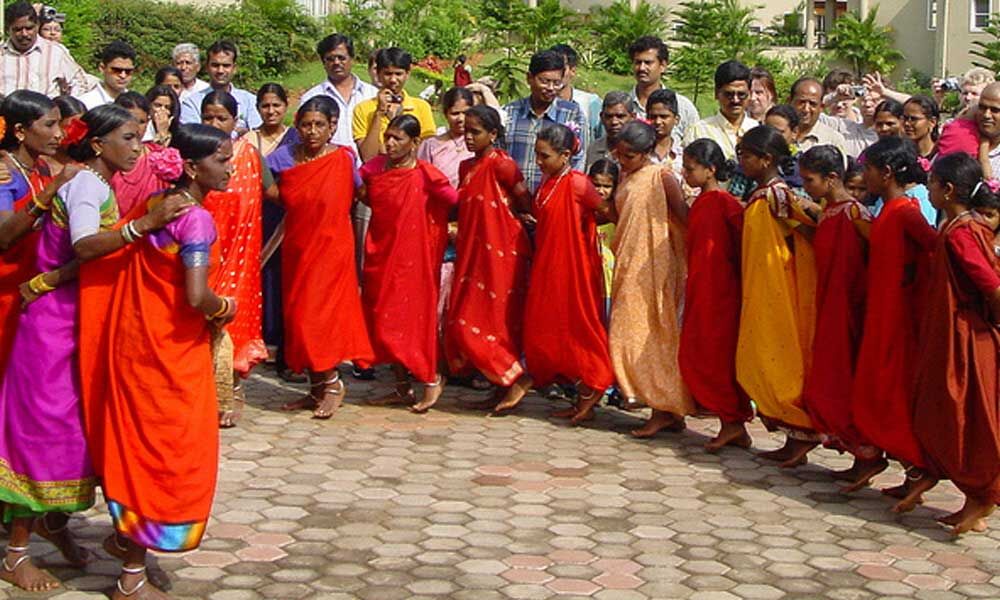Live
- Odisha BJP chief to be elected in January
- AP Home Minister Anitha alerts officials amid rains in heavy Rains in Tirupati
- Taluk Guarantee panel
- Uber Launches Uber Moto Women for Safer and Flexible Rides in Bengaluru
- ‘Fear’ pre-release event creates waves
- Champions Trophy 2025 Host Change? Indian Broadcaster's Promo Sparks Controversy
- Nabha Natesh introduced as Sundara Valli from ‘Swayambhu’
- Aamir Khan praises Upendra's ‘UI: The Movie’ ahead of its release
- Celebrations: Keerthy Suresh ties the knot with Antony Thattil
- Indian scientists develop flexible near-infrared devices for wearable sensors
Just In
Empowering tribals for self-sustenance


Empowering tribals for self-sustenance
A story that once again showcases the Van Dhan tribal start-ups programme, a component of the ‘Mechanism for Marketing of Minor Forest Produce (MFP) through Minimum Support Price (MSP) and Development of Value Chain for MFP’ Scheme, has emerged as a major source of employment for local tribals is the success of VDVK Adivasi Eakatmik Samajik Sanstha, Shahapur.
A story that once again showcases the Van Dhan tribal start-ups programme, a component of the 'Mechanism for Marketing of Minor Forest Produce (MFP) through Minimum Support Price (MSP) and Development of Value Chain for MFP' Scheme, has emerged as a major source of employment for local tribals is the success of VDVK Adivasi Eakatmik Samajik Sanstha, Shahapur.
VDVK Adivasi Eakatmik Samajik Sanstha, Shahapur is a perfect example of tribal entrepreneurship and demonstrates how cluster development and value addition can help members earn significantly higher income. In a world filled with pessimism, negativity and deprivation, examples of such successful cooperatives are always inspiring. Surrounded by the mountain ranges of the Western Ghats, Shahapur is the largest taluka in Thane district in Maharashtra and is seen as an upcoming region.
The majority of tribals who form the members of this VDVK are from the Katkari community. Katkari is a primitive tribe found in Maharashtra (Pune, Raigad and Thane districts) and parts of Gujarat. The tribals are mainly agricultural labourers and sell firewood and some jungle fruits. Started by Sunil Pawaran, an enterprising member of this community and his friends to sell raw Giloy in local markets has now become a 300 member VDVK under the Van Dhan Yojana scheme.
The VDVK has a much larger scale of operations and deals with more than 35 products and processed food items. The process of making Giloy powder involves cutting Giloy from the trees by tribal which is followed by drying for 8-10 days. This dry Giloy is brought to the central facility in Shahapur where it is grinded, packaged and branded and subsequently shipped to buyers including Tribes India.
Operating as a cluster, the VDVK has sold raw Giloy to leading companies of the country. While the Covid-19 pandemic and the nationwide lockdown that followed did disrupt the VDVK's operations, it did not deter the morale of the team. Through the lockdown, the VDVK continued to work hard to minimize the impact. Between March 2020 and mid-June 2020, VDVK Shahapur purchased over 34,000 kg of raw Giloy from the local tribals. Subsequently with the unlocking and slow return to normalcy, the VDVK is working aggressively to expand and make its products available for purchase on e-commerce platforms.
While it is Giloy, raw and processed, continues to be the VDVK's mainstay, it has now expanded into other products such as Safed Musali, Jamun, Behada, Vavding, Moringa, Neem, Amla, and orange peel powder. The success has inspired thousands of people from the community and nearby areas to come together and work on similar lines. In all 39 VDVKs comprising 12,000 beneficiaries have been additionally sanctioned by TRIFED so far.
The Van Dhan Vikas Yojana is a programme for value addition, branding and marketing of Minor Forest Produces by establishing Van Dhan Kendras to facilitate creation of sustainable livelihoods for the forest-based tribes. The scheme aims to empower tribals by providing them support in terms of financial capital, training, mentoring, etc. in order to expand their business and enhance earnings. Our role? Let us encourage these products for the larger good of the tribals.

© 2024 Hyderabad Media House Limited/The Hans India. All rights reserved. Powered by hocalwire.com






